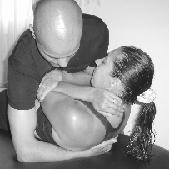Neck Pain? Thoracic Manips & 93% Success Rate
Of patients with neck pain, who is likely to benefit from T-spine manipulations?
This study found the answers by demonstrating 6 clinical prediction rules (CPR) to identify those with neck pain who were most apt to rapidly improve from T-spine thrust manipulations.
Only if the patients reported of feeling either “quite a bit better” or “a very great deal better” 2-4 days following the first session were they considered as having a “successful outcome”.
The 6 variables in the CPR were:
- 1)Neck (and /or arm) symptoms less than 30 days
- 2)No symptoms distal to the shoulder
- 3)No pain with active cervical extension
- 4)Diminished upper thoracic spine (T3-5) kyphosis
- 5)Cervical extension ROM less than 30�
- 6)Fear Avoidance Beliefs Questionnaire (FABQ) Physical Activity score less than 12Of the all the 78 patients with neck pain, 42 of them experienced a successful outcome (probability of success =54%).
BUT…
If a patient had 2 out of 6 CPR variables, the probability of success increased to 71%.
If a patient had 3 out of 6 CPR variables, the probability of success increased to 86%.
If a patient had 4 out of 6 CPR variables, the probability of success increased to 93%.
Interestingly, there was no difference in outcomes with PTs of varying levels of experience
Posted on: September 28, 2007Categories: Cervical Spine , Thoracic Spine


